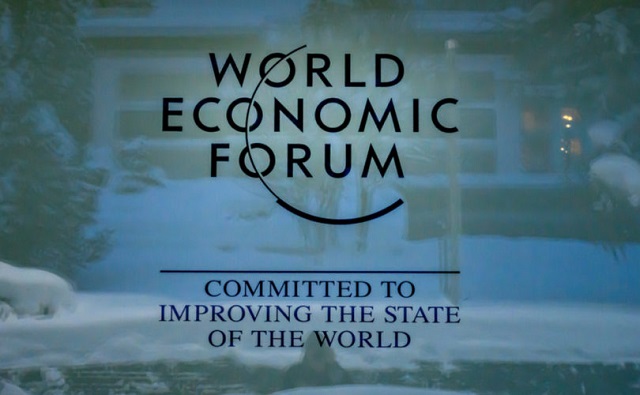Censorship Industrial Complex
World Economic Forum lists ‘disinformation’ and ‘climate change’ as most severe threats in 2024

From LifeSiteNews
By Joe Kovacs
The World Economic Forum’s Global Risks Report 2024 says the world is ‘plagued by a duo of dangerous crises: climate and conflict,’ which are ‘set against a backdrop of rapidly accelerating technological change and economic uncertainty.’
The World Economic Forum, the group of global elites whom those on the political right love to hate, has just issued its report on the biggest threats in 2024 and beyond.
And at the top of its list of risks is not the climate, at least not immediately.
The WEF, based in Davos, Switzerland, says the biggest short-term risk stems from fake news.
“While climate-related risks remain a dominant theme, the threat from misinformation and disinformation is identified as the most severe short-term threat in the 2024 report,” the group indicated.
“The cascading shocks that have beset the world in recent years are proving intractable. War and conflict, polarized politics, a continuing cost-of-living crisis and the ever-increasing impacts of a changing climate are destabilizing the global order.”
“The report reveals a world ‘plagued by a duo of dangerous crises: climate and conflict.’ These threats are set against a backdrop of rapidly accelerating technological change and economic uncertainty.”
The globalists say “the growing concern about misinformation and disinformation is in large part driven by the potential for AI, in the hands of bad actors, to flood global information systems with false narratives.”

The report states that over the next two years, “foreign and domestic actors alike will leverage misinformation and disinformation to widen societal and political divides.”
It indicates the threat is enhanced by large elections with more than 3 billion people heading to the polls in 2024 and 2025 in the U.S., Britain, and India.
The report suggests the spread of mis- and disinformation could result in civil unrest, but could also drive government-driven censorship, domestic propaganda and controls on the free flow of information.
Rounding out the top ten risks for the next two years are: extreme weather events, societal polarization, cyber insecurity, interstate armed conflict, lack of economic opportunity, inflation, involuntary migration, economic downturn and pollution.
The ten-year list of risks puts extreme weather events at No. 1, followed by critical change to Earth systems, biodiversity loss and economic collapse, natural resource shortages, misinformation and disinformation, adverse outcomes of AI technologies, involuntary migration, cyber insecurity, societal polarization and pollution.
Reprinted with permission from the WND News Center.
Censorship Industrial Complex
Canada’s justice minister confirms ‘hate crimes’ bill applies to online content

From LifeSiteNews
Individuals could be criminally charged for social media posts or other online content deemed offensive by the government under the Combating Hate Act.
Canadian Justice Minister Sean Fraser admitted that his new “hate crime” bill would indeed allow a person to be criminally charged for social media posts deemed offensive by the government.
Recently asked about Bill C-9, the Combating Hate Act, Fraser said the bill would indeed apply to certain online content that involves the “willful promotion of hatred.”
“Generally speaking, the law will apply equally online as it does in real communities,” he said, adding, “just in the limited circumstances where there is the willful promotion of hatred against someone.”
As reported by LifeSiteNews, Bill C-9 has been blasted by constitutional experts as allowing empowered police and the government to go after those it deems have violated a person’s “feelings” in a “hateful” way.
Bill C-9 was brought forth in the House of Commons on September 19 by Fraser. The Liberals have boasted that the bill will make it a crime for people to block the entrance to, or intimidate people from attending, a church or other place of worship, a school, or a community center. The bill would also make it a crime to promote so-called hate symbols and would, in effect, ban the display of certain symbols such as the Nazi flag.
While being questioned by Conservative MP Andrew Lawton about Bill C-9, Fraser was asked if the new law would “affect what people can say and write on the internet” and also if people could be retroactively punished for online comments made today.
In reply, Fraser said, “The only circumstance where you could imagine some online comment attracting scrutiny under this law would attach to behaviour that is criminal today but would be punished less severely.”
He said that “(t)he willful promotion of hate is a crime today, but we want to recognize a distinct charge where that same behaviour uses certain symbols of hate to bring a higher degree of culpability.”
John Carpay of the Justice Centre for Constitutional Freedoms (JCCF) has blasted Bill C-9 as something that would “empower police” and the government to go after those it deems have violated a person’s “feelings” in a “hateful” way.
Also, as reported by LifeSiteNews, Conservative MP Leslyn Lewis called out the hypocrisy of Bill C-9 for being silent regarding rising “Christian hate.”
Lewis has warned before that Bill C-9 will open the door for authorities to prosecute Canadians’ speech deemed “hateful possibly.”
Carpay also lamented how the bill mentions “rising antisemitism” but says nothing about the arson attacks on Catholic and Christian churches plaguing Canada.
“Anti-Catholic hate is obviously not on the minister’s radar. If it were, he would have mentioned it when introducing the Combating Hate Act,” Carpay wrote.
Since taking power in 2015, the Liberal government has introduced numerous new bills that, in effect, censor internet content and restrict people’s ability to express their views.
Censorship Industrial Complex
Who tries to silence free speech? Apparently who ever is in power.

Now that Trump is running Washington, Conservative thinkers must ponder a new-found appreciation for silencing speech they don’t like.
From StosselTV
War on Words: Both Parties Try to Silence Speech They Don’t Like
Donald Trump, before he was reelected, said he’d end government censorship. But now that he’s in office? He calls speech he doesn’t like “illegal.”
Free Speech should be a bedrock American value, no matter who’s in office. After the murder of Charlie Kirk, Republicans, who once complained about censorship, became censors. Democrats suddenly flip-flopped. All politicians should remember, the way to fight speech you don’t like, is with more speech, not censorship.
After 40+ years of reporting, I now understand the importance of limited government and personal freedom.
——————————————
Libertarian journalist John Stossel created Stossel TV to explain liberty and free markets to young people.
Prior to Stossel TV he hosted a show on Fox Business and co-anchored ABC’s primetime newsmagazine show, 20/20.
Stossel’s economic programs have been adapted into teaching kits by a non-profit organization, “Stossel in the Classroom.” High school teachers in American public schools now use the videos to help educate their students on economics and economic freedom. They are seen by more than 12 million students every year.
———
To make sure you receive the weekly video from Stossel TV, sign up here: https://www.johnstossel.com/#subscrib…
———
-

 Business1 day ago
Business1 day agoThe painful return of food inflation exposes Canada’s trade failures
-

 Business13 hours ago
Business13 hours agoTrans Mountain executive says it’s time to fix the system, expand access, and think like a nation builder
-

 Business1 day ago
Business1 day agoCBC uses tax dollars to hire more bureaucrats, fewer journalists
-

 National1 day ago
National1 day agoElection Officials Warn MPs: Canada’s Ballot System Is Being Exploited
-

 Business1 day ago
Business1 day agoPaying for Trudeau’s EV Gamble: Ottawa Bought Jobs That Disappeared
-

 Bruce Dowbiggin1 day ago
Bruce Dowbiggin1 day agoIs Roundball A Square Game? Sports Betting Takes Another Hit
-

 Alberta2 days ago
Alberta2 days agoCoutts border officers seize 77 KG of cocaine in commercial truck entering Canada – Street value of $7 Million
-

 Alberta23 hours ago
Alberta23 hours agoPremier Smith sending teachers back to school and setting up classroom complexity task force







